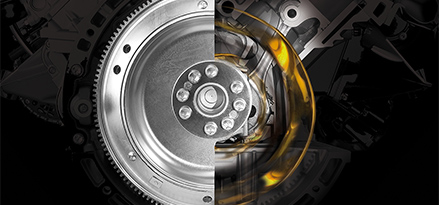There are two basic types of lubricants available:
- Conventional mineral oils are the traditional types.
- Synthetic lubricants, which are growing in popularity.
Both types are made from crude oil that comes from the ground. The difference is that synthetic oils are made from more advanced refining processes and are of a higher purity and quality than conventional mineral oils. This not only removes more impurities from the crude oil, it enables individual molecules in the oil to be tailored to the demands of modern engines. These customised molecules provide higher levels of protection and performance.
As oil circulates through your engine it can pick up deposits. Over time, conventional oils can sometimes form sludge, which can reduce your engine’s efficiency and, ultimately, reduce the life of your engine. Synthetic motor oils contain fewer impurities compared to conventional motor oils and can better resist the formation of sludge, thereby preventing deposits from forming in your engine.
Engine parts are in constant contact with each other. They’re also moving at high speeds. In the extreme environment of your engine, components can wear and break down. Your motor oil is the protective barrier between these components. As conventional oils break down, their ability to prevent engine wear diminishes. Synthetic oils, on the other hand, retain their wear protection properties for a much longer time, increasing engine life.
When your car sits for a while (let’s say overnight) the oil settles when you fire up the ignition, it begins flowing through critical engine parts to protect against friction. With conventional oils, it takes more time until they are able to flow smoothly through the engine.
When running, engines are hot. Really, really hot. Over time, the high temperatures in your engine can cause conventional motor oils to break down or evaporate exposing your engine to wear. Synthetic motor oils are engineered to resist these high temperatures, which is especially important if you’re driving in hot climates.
To meet consumer demand, automakers are building cars with smaller engines (for greater fuel efficiency) but adding turbochargers (to boost power). We already mentioned how engines run at high temperatures, which can break down conventional oils faster, but today’s turbocharged engines are even more aggressive. The shaft inside a turbocharger can spin upwards of 200,000 revolutions per minute, so it’s critical that your motor oil can get to that shaft and lubricate it properly very quickly.
Conventional oils can break down faster under these conditions and leave deposits on turbocharger components, which can lead to failure. Synthetic oils can protect these components much better than conventional oils, keeping them operating at peak performance and boosting your engine’s power. Find out more on how our engineers develop new products and continually refine the entire range of ExxonMobil products.
Fuel economy and greenhouse gas regulations have changed the way engines are built. Due to a heightened focus on increasing mpg, smaller four-cylinder engines with complicated systems –hybrid, stop-start and turbo –are now replacing larger six-and eight-cylinder engines. Turbocharged engines have emerged as the answer to vehicle manufacturers’ needs to deliver fuel efficiency without sacrificing power.
We already mentioned how engines run at high temperatures, which can break down conventional oils faster, but today’s turbocharged engines are even more aggressive. While engine crankshafts average about 3,000 rpm at motorway speeds, the turbocharger shaft can reach speeds up to 200,000 rpm. Additionally, the oil in a turbocharger can exceed temperatures of 200⁰C, which is about twice the average heat of non-turbocharged engines. Such high speeds and temperatures can cause some motor oils to decompose, resulting in more engine deposits and diminished performance. Synthetic oils can protect these components much better than conventional oils, keeping them operating at peak performance and boosting your engine’s power.
Mobil 1 oils are setting the standard for turbocharged engine performance and protection.
Mobil 1 oils resist breakdown by delivering outstanding oxidation stability and thermal protection down to -40⁰C and up to 260⁰C. When used in turbocharged applications, Mobil 1 oils offer exceptional:
Protection of thrust bearing
Varnish control on shaft bushing
Deposit and build-up control on the compressor, compressor seal plate and turbo housing
More than 70 of the top performance vehicles, many of which feature turbos, roll off factory lines with Mobil 1 oil inside. From Mercedes-AMG to Porsche, vehicle manufacturers trust Mobil 1 oil as the factory fill and recommended service fill to help protect their modern turbocharged engines.
-

Why choose a synthetic oil?
Your engine is a complex machine with hundreds of moving parts that operate under a wide range of temperatures and stressors. The oil you select needs to be equally capable of coping with these operating conditions to protect your engine.
Learn more -

What is synthetic oil?
Motor oils aren’t created equal. You might already know that synthetic oils outperform conventional oils, but you might not know the difference between synthetic blend oils and fully synthetic oils.
Learn more


